Coffee grounds are a popular addition to many gardens, as they are known to be rich in nutrients that can help plants grow. However, some plants are known to be more sensitive to coffee grounds than others. Ferns are one type of plant that may be adversely affected by coffee grounds. This is because ferns are sensitive to changes in pH levels, and coffee grounds can make soil more acidic.
Are coffee grounds good for Ferns?
They are easy to care for and don’t require a lot of attention. One question that many people have is whether or not coffee grounds are good for ferns. Ferns are a type of plant that many people enjoy having in their home.
The answer is yes, coffee grounds are good for ferns. They also help to keep the soil moist, which is important for ferns. Coffee grounds provide nutrients that ferns need in order to grow.
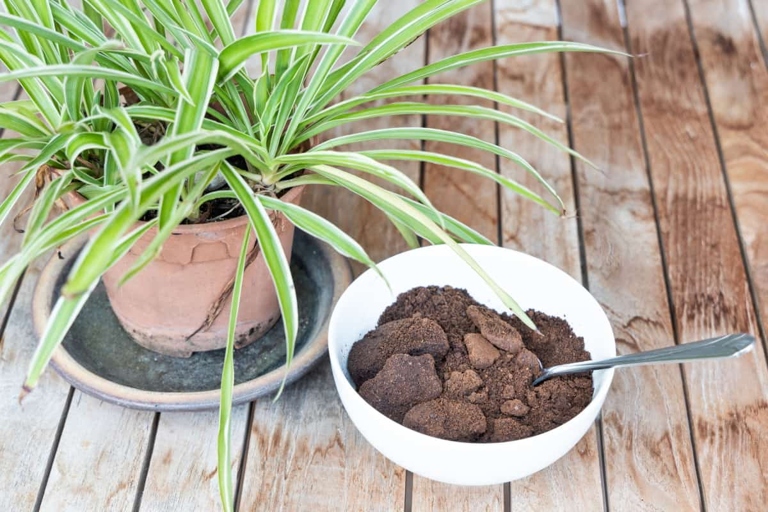
You may be surprised at how well your fern grows! If you have a fern, try adding some coffee grounds to the soil.
Best Ways to Use Coffee Ground on Ferns
Some people may not know that coffee grounds can be used to help fertilize ferns. They are relatively easy to care for and can add a touch of greenery to any room. Ferns are a type of plant that many people enjoy having in their homes.
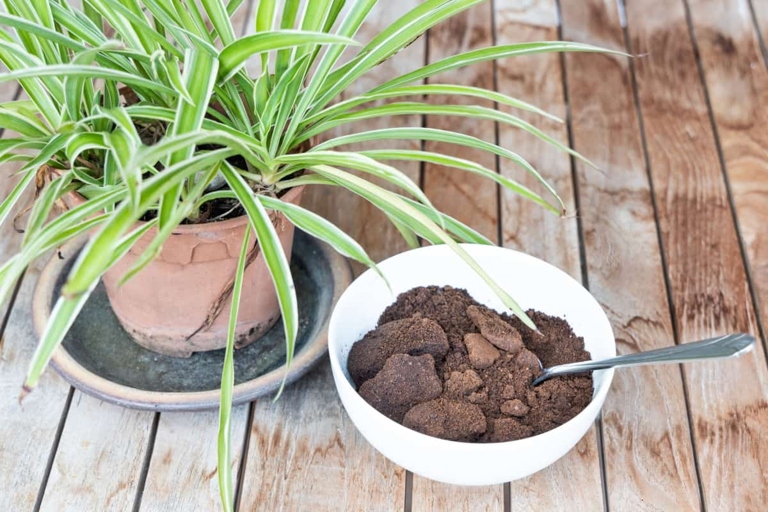
When used as a fertilizer, coffee grounds can help promote growth and keep ferns healthy. It is important to remember that coffee grounds should only be used as a supplement and not as the sole source of nutrients for ferns. Coffee grounds are a great source of nitrogen, which is an essential nutrient for plants.
When used properly, coffee grounds can be a great way to give your ferns the extra boost they need to stay healthy and thrive. Be sure to use coffee grounds in moderation, as too much can actually harm plants. To use coffee grounds as a fertilizer, simply sprinkle them around the base of the plant. You can also add used coffee grounds to the soil when you are potting or repotting ferns.
Composting with Coffee Grounds
When it comes to composting, coffee grounds are a great addition to the mix. Not only do they provide nutrients that plants need, but they also help to aerate the soil and improve drainage. Coffee grounds can also help to deter pests and improve the overall health of your plants.
If you’re looking to add coffee grounds to your compost pile, there are a few things to keep in mind. First, coffee grounds should be added in moderation – too much and you risk making your compost too acidic. Second, coffee grounds should be mixed in with other organic matter, such as leaves and grass clippings, to create a well-balanced compost.
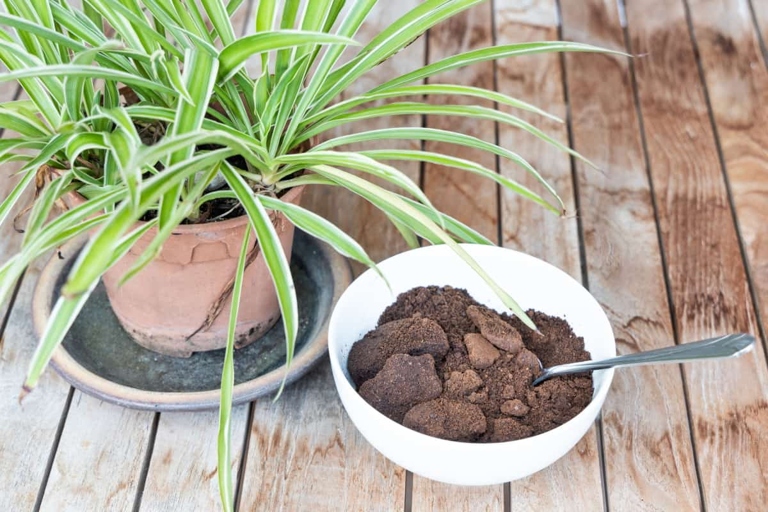
Finally, it’s important to keep an eye on your compost pile and make sure it’s getting enough air and moisture. If it starts to smell bad or looks overly wet, it’s time to give it a little stir. With a little care, your compost pile will be rich in nutrients and ready to help your plants thrive.
Coffee Grounds as Organic Fertilizer
Used coffee grounds also improve soil drainage and aeration, and they can help to control weeds. Coffee grounds contain nitrogen, phosphorus, and potassium, which are essential nutrients for plant growth. Organic coffee grounds can be used as a fertilizer for ferns.
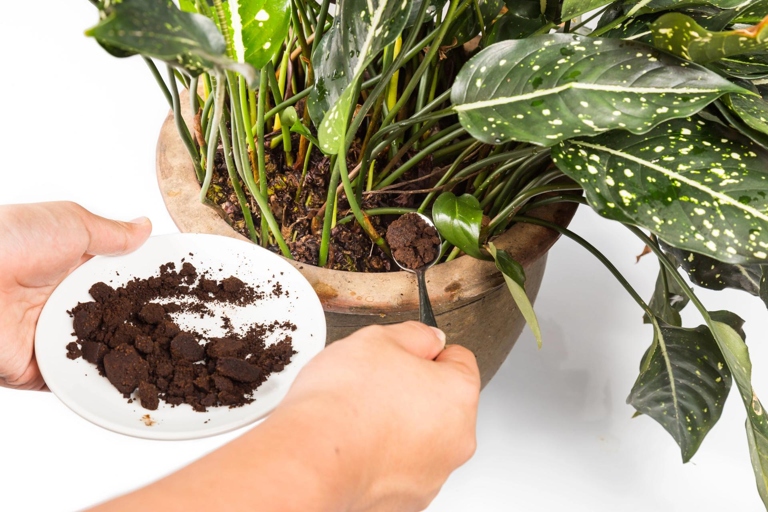
You can also add used coffee grounds to compost or mix them into the soil before planting. To use coffee grounds as a fertilizer, simply spread them around the base of the fern plant.
Mix with Mulch
Because of their ability to grow in shady areas, ferns are a popular choice for gardens. Ferns are a type of plant that can prosper in many different types of environments. They are often found in wooded areas or near bodies of water.
It can also help to control weeds. Mulching helps to retain moisture and keep the roots of the plant cool. However, they can benefit from being mulched. Ferns generally do not require a lot of care.
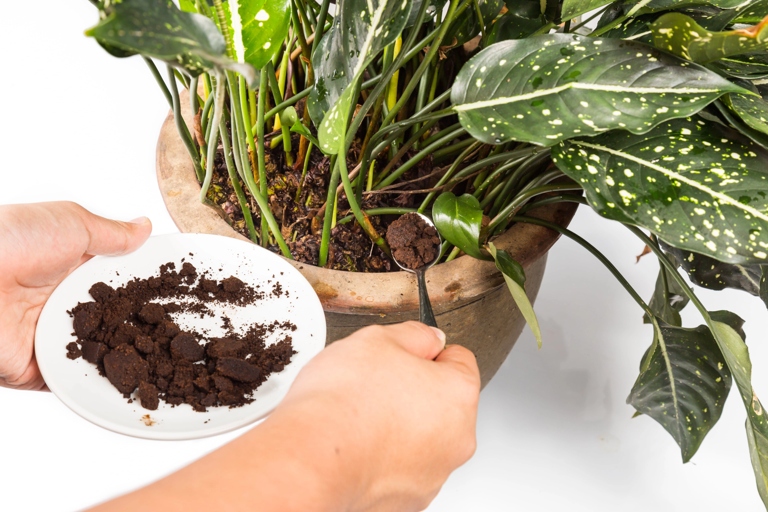
There are a few things to keep in mind when mulching ferns. This will help to prevent the roots from rotting. It is important to use a light-colored mulch, such as pine straw or cypress mulch. It is also important to keep the mulch a few inches away from the base of the plant. This will help to reflect light and prevent the ferns from getting too hot.
Coffee Grounds as Compost Tea
It is easy to make, and coffee grounds are a great source of nutrients for your plants. Coffee grounds are a popular addition to compost piles, but did you know that you can also use them to make compost tea? Compost tea is a liquid fertilizer that you can use to water your plants.
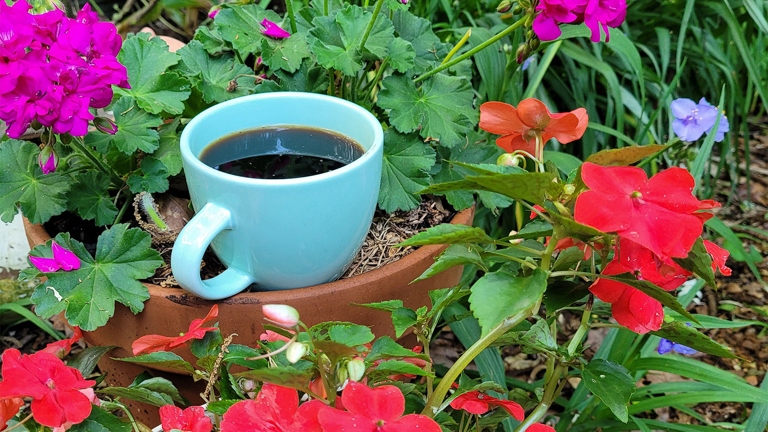
Add more water, and then stir the mixture. You can use a coffee filter to strain the grounds if you like. Start by adding a few inches of water to your container. Let it sit for a few days, and then water your plants with it. Then, add a layer of coffee grounds. To make compost tea, you will need a container, some coffee grounds, and water.
Compost tea is a great way to give your plants a boost of nutrients. Coffee grounds are a natural source of nitrogen, phosphorus, and potassium, which are all essential for plant growth. If you make compost tea regularly, you will notice that your plants will be healthier and more vibrant.
Add Coffee Grounds to The Potting Mix When Repotting
When it comes to repotting ferns, coffee grounds can be a great addition to the potting mix. Just be sure to use a light hand when adding coffee grounds to the potting mix, as too much can make the mix too dense and cause problems for the fern. Coffee grounds help to improve drainage and aeration while also providing a bit of extra nutrients for the plant.
Water After Application
It’s no secret that coffee grounds are great for your garden. But what about after you’ve applied them to your plants? Do ferns like coffee grounds? They improve drainage, aeration, and water retention in the soil.
When applied to the soil around ferns, coffee grounds help the plants absorb and retain moisture. This is especially beneficial during hot, dry weather when ferns are more likely to experience water stress. It turns out that coffee grounds can actually help ferns retain water.
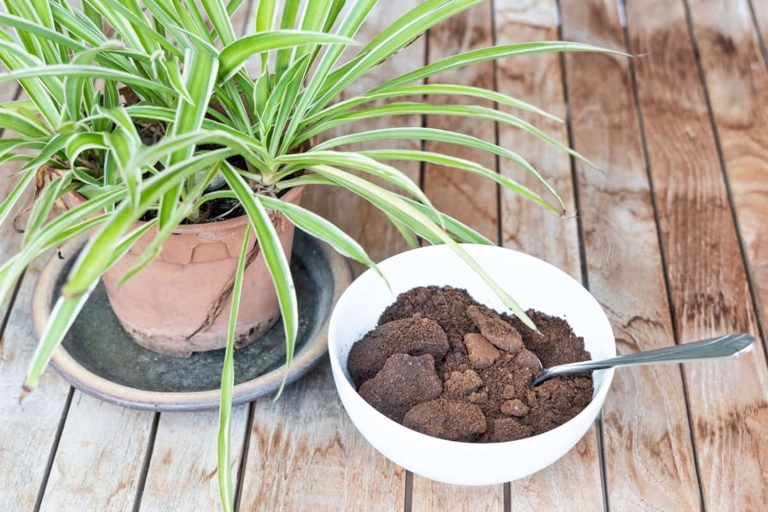
Your plants will thank you for it! So, if you’re looking for a way to help your ferns survive the summer heat, consider adding coffee grounds to their watering routine.
Don’t Use Coffee Grounds for Seedlings!
If you’re thinking about using coffee grounds to fertilize your ferns, think again! Coffee grounds can actually be harmful to ferns, and should be avoided.

Coffee grounds can also make the soil too acidic for ferns, which prefer a more neutral pH. Nitrogen is a key element in plant growth, but too much nitrogen can lead to leaf burn and other problems. Coffee grounds are high in nitrogen, which can cause problems for ferns.
Coffee grounds can be used in other ways around the garden, but they should be avoided when it comes to ferns. If you’re looking for a way to fertilize your ferns, try using compost or other organic matter instead.
Benefits of Using Coffee Grounds
Coffee grounds are a natural byproduct of coffee brewing and can be used in many different ways. Here are three benefits of using coffee grounds:
Coffee grounds can be used as a natural fertilizer. They are rich in nitrogen and other nutrients that can help plants grow. 1.
Coffee grounds can be used to deter pests. Ants, slugs, and other pests are not fond of the smell of coffee and will stay away from areas where coffee grounds are present. 2.
Coffee grounds can be used to make compost. 3. Compost is a great way to add nutrients to the soil and help plants grow. Coffee grounds can be added to a compost bin along with other organic materials.
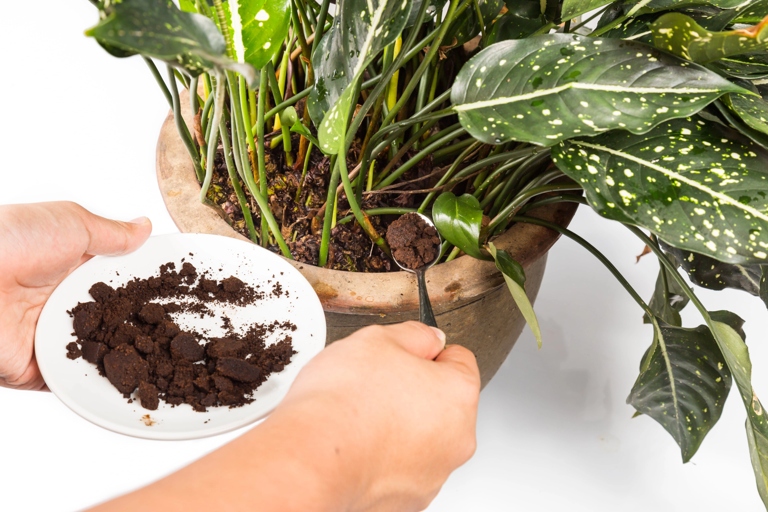
There are many other uses for coffee grounds, but these are three of the most popular. If you have coffee grounds, don’t throw them away – put them to good use!
Adds Nitrogen to the Soil
Nitrogen is a key element in the growth of all plants, and it is especially important for ferns. One of the things that ferns need in order to grow is nitrogen. Ferns are a type of plant that can prosper in many different types of environments.
Coffee grounds are a great source of nitrogen, and they can be easily added to the soil. Simply add the coffee grounds to the soil around the fern, and water them in. There are a few different ways to add nitrogen to the soil. One way is to use coffee grounds.
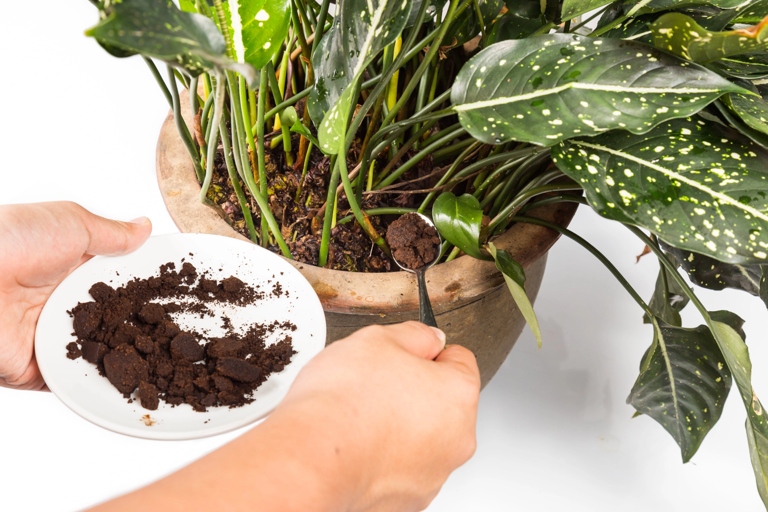
Another way to add nitrogen to the soil is to use compost. Compost is a great way to add nutrients to the soil, and it will also help to improve the drainage and structure of the soil. Simply add a layer of compost to the soil around the fern, and water it in.
Adding nitrogen to the soil is a key part of growing healthy ferns. By using coffee grounds or compost, you can easily add this important element to the soil.
Prevents Disease Causing Agents
But did you know that ferns can also help prevent disease-causing agents? They’re easy to care for and can thrive in a variety of environments. Ferns are one of the most popular houseplants, and for good reason.
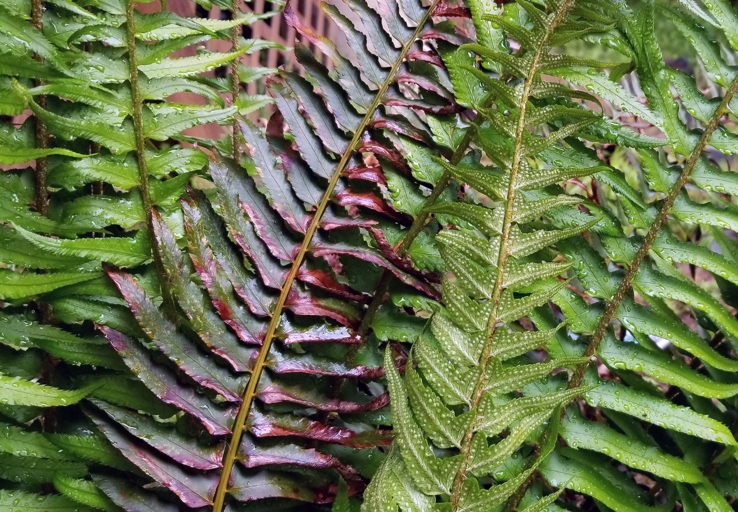
This means that it can help protect against harmful bacteria and fungi that can cause disease. Ferns release a substance called phytoncides, which has been shown to have antimicrobial and antifungal properties.
In one study, phytoncides were shown to reduce the incidence of respiratory infections in office workers. In another study, they were found to improve the immune system function of elderly people.
So if you’re looking for a plant that can do more than just look good, consider a fern. Not only will it help purify the air in your home, but it can also help protect you from disease-causing agents.
Deter Pests
There are a few things that you can do to deter pests from your ferns. However, ferns can also be a target for pests. Ferns are a type of plant that is often used as a decoration in homes and gardens. They are known for their delicate leaves and beautiful appearance.
One way to deter pests is to use coffee grounds. Simply sprinkle some coffee grounds around your ferns and pests should stay away. Coffee grounds contain a chemical called caffeine which can be toxic to pests.
This will make it difficult for pests to reach the leaves and roots of the plant. Another way to keep pests away from your ferns is to create a barrier. You can do this by placing a layer of gravel or rocks around the base of the plant.
This will kill any insects that are feeding on the plant. Simply mix some soap with water and spray it on the leaves of the plant. Finally, you can also use insecticidal soap to kill any pests that are already on your ferns.
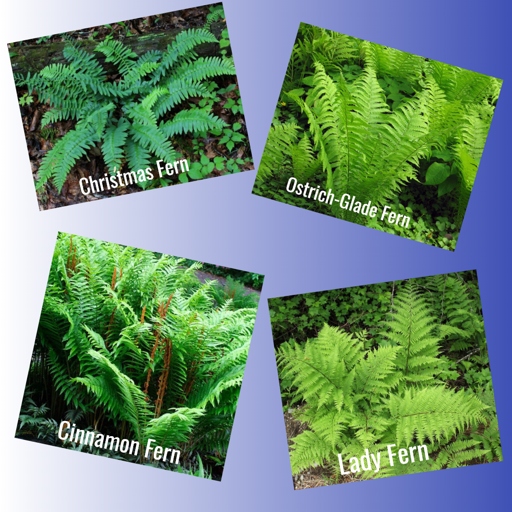
By following these tips, you can deter pests from your ferns and keep them looking their best.
Improves Soil Quality
Ferns are a type of plant that can improve the quality of your soil. When ferns decompose, they release nutrients that can help other plants grow. The coffee grounds will help to keep the soil moist and will also provide the ferns with a source of nitrogen. If you have a coffee plant, consider using the grounds as mulch for your ferns. Additionally, ferns help to aerate the soil and improve drainage.
Improves Water Retention Capacity
Ferns are a type of plant that can be found in many different environments, including coffee grounds. They are known for their ability to improve water retention capacity, making them an ideal plant for coffee grounds.
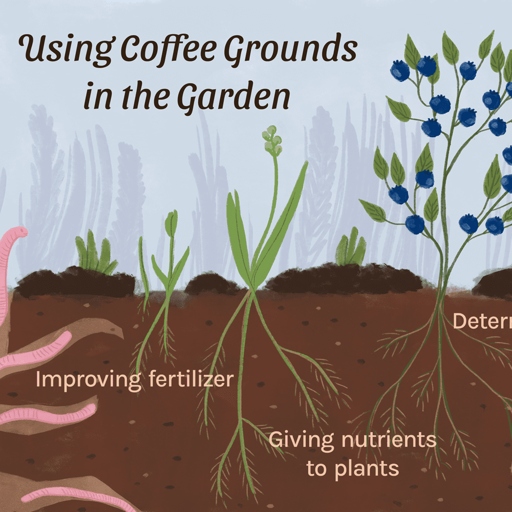
Ferns have a high surface area to volume ratio, which allows them to absorb more water than other plants. This makes them ideal for coffee grounds, which can be very dry. In addition, ferns can also help to aerate the coffee grounds and improve drainage.
They are easy to care for and can help to improve the quality of the coffee grounds. Ferns are a valuable addition to any coffee ground garden.
Improves Drainage Capacity
Coffee grounds help to aerate the soil and improve drainage by providing a network of small pores that allow water to flow through. In addition, coffee grounds add nutrients to the soil that are beneficial for plant growth. They also help to retain moisture in the soil, which is beneficial for ferns. One of the best ways to improve drainage capacity in these areas is to add coffee grounds to the soil. Ferns are a type of plant that thrive in moist, shady environments.
Keeps Pets Away
Ferns are a type of plant that can be found in many different environments, from tropical rain forests to the coldest mountains. They are known for their delicate, lacey leaves and for being one of the oldest groups of plants on Earth.
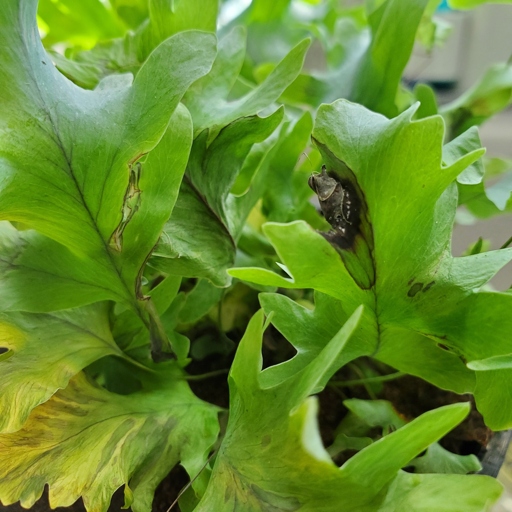
Ferns are not particularly fond of coffee grounds, and in fact, coffee grounds can actually help to keep ferns away. Coffee grounds contain high levels of nitrogen, which can be toxic to ferns. When used as a mulch or added to the soil around ferns, coffee grounds can help to keep these plants healthy and free from pests.
Potential Problems with Using Coffee Grounds on Ferns
This is why some people may hesitate to use coffee grounds on their ferns, as coffee grounds can potentially alter the delicate balance that ferns need to stay healthy. While they are typically known for their ability to thrive in moist conditions, ferns can also be quite sensitive to changes in their environment. Ferns are a type of plant that can be found in many different environments, including rain forests, woodlands, and even your own backyard.
While this may seem like a good thing, too much nitrogen can actually lead to problems such as leaf burn or stunted growth. One potential problem with using coffee grounds on ferns is that coffee grounds are acidic. While some ferns can tolerate slightly acidic conditions, others may struggle to survive in these conditions. Additionally, coffee grounds can also add extra nitrogen to the soil. This means that they can lower the pH of the soil around the fern, making it more acidic.

However, it is important to be aware of the potential risks involved before making a decision. Ultimately, it is up to the individual gardener to decide whether or not they want to use coffee grounds on their ferns.
Promotes Fungal Growth
Ferns are a type of plant that is known to promote the growth of fungi. In fact, studies have shown that ferns can increase the growth of fungi by up to 100%. This is because ferns release a compound called sporopollenin, which is a nutrient that fungi need to grow.
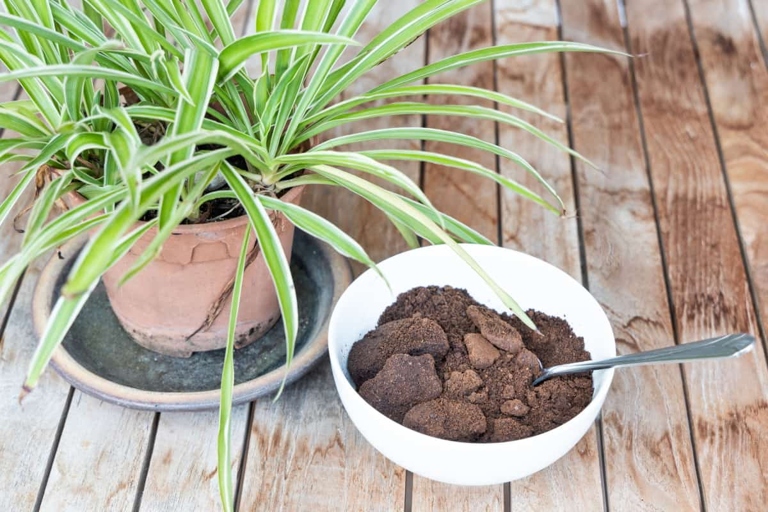
So, if you’re looking to promote the growth of fungi in your garden, then adding some ferns may be a good idea. Just make sure to keep them away from any other plants that you don’t want to encourage the growth of fungi on.
Excess Moisture Retention
Ferns are one of the oldest plants on Earth, and they can be found in nearly every corner of the globe. They come in all shapes and sizes, and some can even grow to be as large as trees. Ferns are known for their ability to thrive in shady, moist conditions, which is why they are often used as houseplants.
While ferns prefer moist conditions, they can actually suffer from too much moisture. If the soil is already moist, hold off on watering for a day or two. Excess moisture can cause the leaves of a fern to turn brown and mushy. If you think your fern might be getting too much water, feel the soil before you water it.
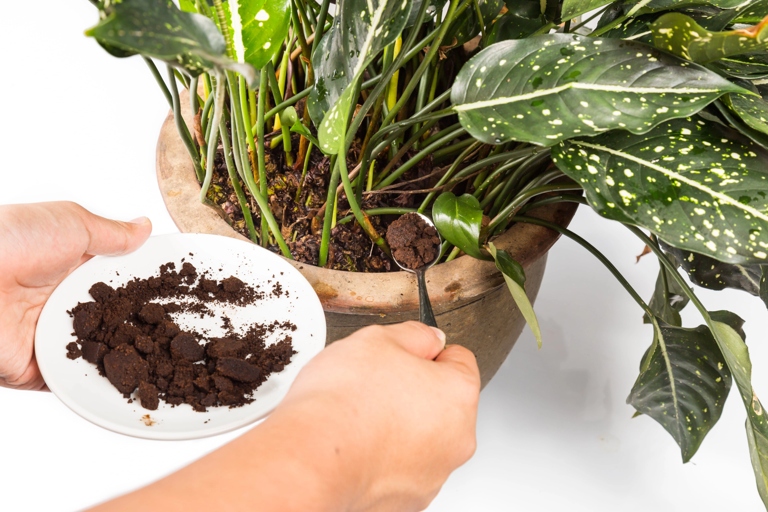
If you think your fern might be suffering from excess moisture, there are a few things you can do to help it recover. You can also try moving your fern to a drier location, or simply allowing the soil to dry out between waterings. If your pot does not have drainage holes, consider repotting your fern into a pot that does. First, make sure you are using a well-draining potting mix.
Attracts pests
Ferns may be known for their delicate leaves, but they can actually be quite tough plants. Many common pests are attracted to ferns, including aphids, scale, and mealybugs. One thing they’re not tough against, however, is pests. These pests can quickly damage a fern, causing the leaves to turn brown and die.
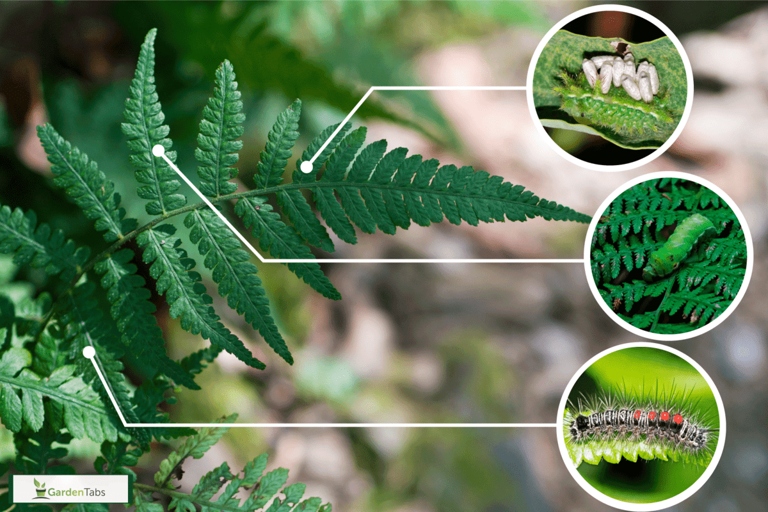
If you see any pests on your fern, you’ll need to take action to remove them. To keep your ferns healthy and free of pests, it’s important to regularly inspect them for signs of infestation. Be sure to follow the instructions on the label carefully to avoid harming your ferns. This may involve using a pesticide or other treatment.
Can Inhibit Growth of Your Ferns!
Ferns are a type of plant that can be found in many different environments, including forests, gardens, and even in homes as houseplants. While they are typically known for their ability to thrive in shady areas, ferns can also grow in sunny spots if they are given enough water.
Nitrogen is a nutrient that is found in many different things, including coffee grounds. One of the things that ferns need in order to grow well is nitrogen. Because of this, many people believe that coffee grounds can be used as a fertilizer for ferns.
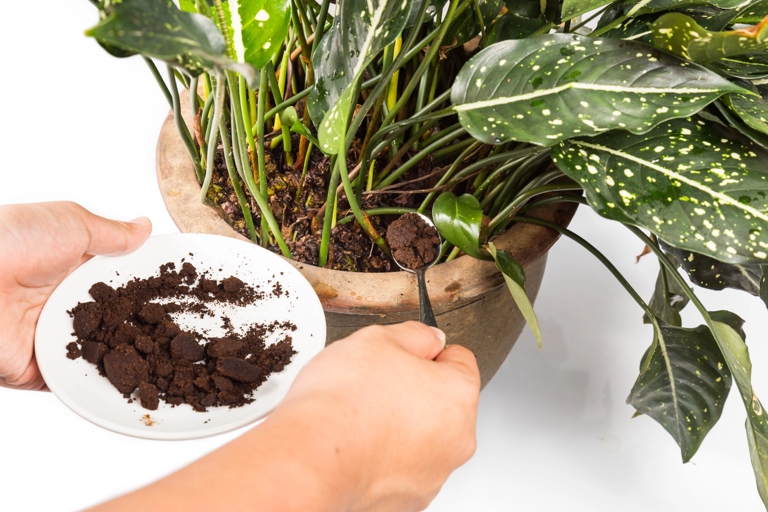
This is because coffee grounds can make the soil too acidic for ferns to grow in. If you are going to use coffee grounds as a fertilizer for your ferns, it is important to make sure that you mix them with other materials so that the acidity level is balanced. However, while coffee grounds can provide nitrogen for ferns, they can also inhibit the growth of the plant.
Potential risks to soil
Ferns are a type of plant that is known to be sensitive to coffee grounds. While coffee grounds can provide a nutrient-rich environment for ferns, they can also be detrimental to the plant.
Nitrogen is an essential nutrient for plants, but too much nitrogen can be harmful. This can lead to the plant becoming leggy and weak, and it may also cause the leaves to turn yellow. When nitrogen levels in the soil are too high, it can cause the plant to grow too quickly. Coffee grounds can contain high levels of nitrogen, which can cause problems for ferns.
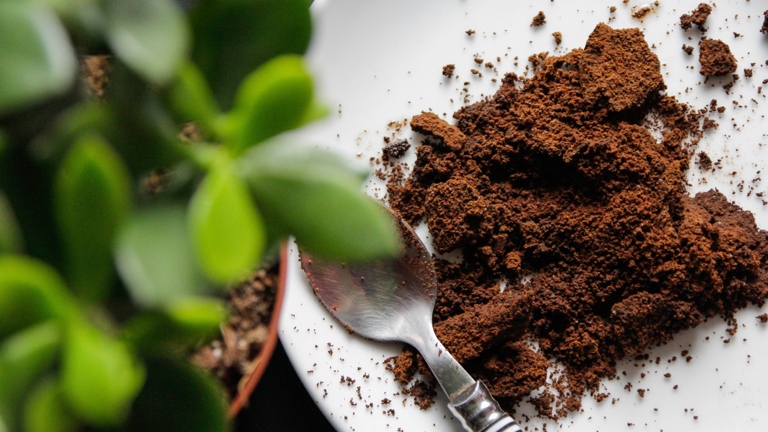
This can cause problems for ferns because they prefer slightly acidic soils. For example, coffee grounds can be acidic. In addition to nitrogen, coffee grounds can also contain other potential risks to soil. If the soil is too acidic, it can damage the roots of the plant.
Coffee grounds can also contain caffeine. While this might not seem like a big deal, caffeine can actually be harmful to plants. Caffeine can inhibit the uptake of water and nutrients by the roots, and it can also cause the plant to become more susceptible to stress.
It is important to be aware of these risks before using coffee grounds in your garden. Overall, coffee grounds can be both good and bad for ferns. While they can provide a nutrient-rich environment, they can also contain potential risks.
How Much Coffee Should I Add to My Ferns, And How Often?
One of the best ways to provide nutrients for your fern is by using coffee grounds. Ferns are a type of plant that can prosper in a variety of environments, including those that are humid and shady. Coffee grounds can help to improve the drainage and aeration of the soil, as well as provide a slow-release source of nitrogen.
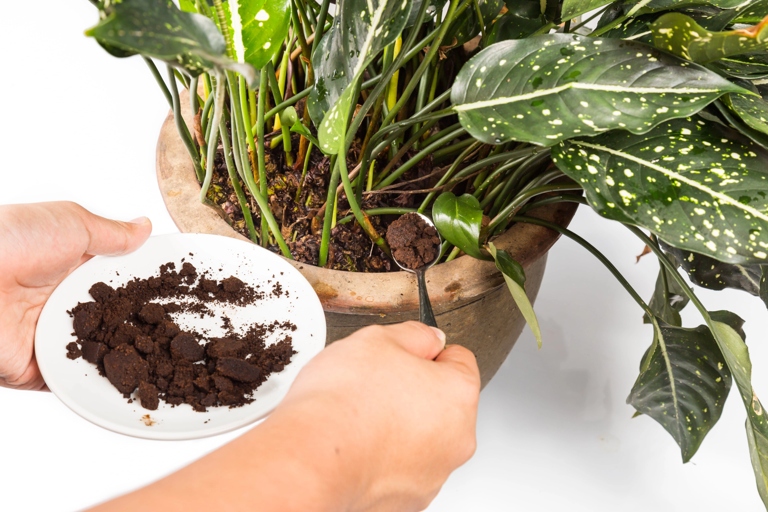
You can add coffee grounds to your ferns every two to three weeks. When adding coffee grounds to your ferns, be sure to use them in moderation. A general rule of thumb is to add about one cup of coffee grounds per square foot of fern bedding. Too much coffee can make the soil too acidic for the ferns.
Frequently Asked Questions
1. Do ferns like coffee grounds?
Ferns enjoy the nutrients found in coffee grounds, making them a great addition to your plant’s diet. However, too much coffee can make the soil too acidic for ferns, so be sure to use it in moderation.
2. How often should I feed my fern coffee grounds?
A general rule of thumb is to give your fern one cup of coffee grounds per month. However, this may vary depending on the size and type of fern, so it’s best to consult your plant care guide.
3. Can I use used coffee grounds?
Yes, used coffee grounds are just as good for your fern as fresh grounds. Just be sure to let them cool completely before adding them to the soil.
4. Do I need to add anything else to the coffee grounds?
No, coffee grounds can be used alone or mixed with other organic matter like compost.
5. Will coffee grounds help my fern grow faster?
Coffee grounds provide a small boost of nitrogen, which is essential for plant growth. However, they won’t make your fern grow any faster than it would otherwise.
Final thoughts
Ferns are a type of plant that can prosper in many different types of environments. When it comes to coffee grounds, ferns seem to enjoy the acidic environment that coffee grounds provide. Coffee grounds can help to improve the drainage of the soil and also help to keep the soil moist. Overall, ferns seem to benefit from being grown in coffee grounds.
